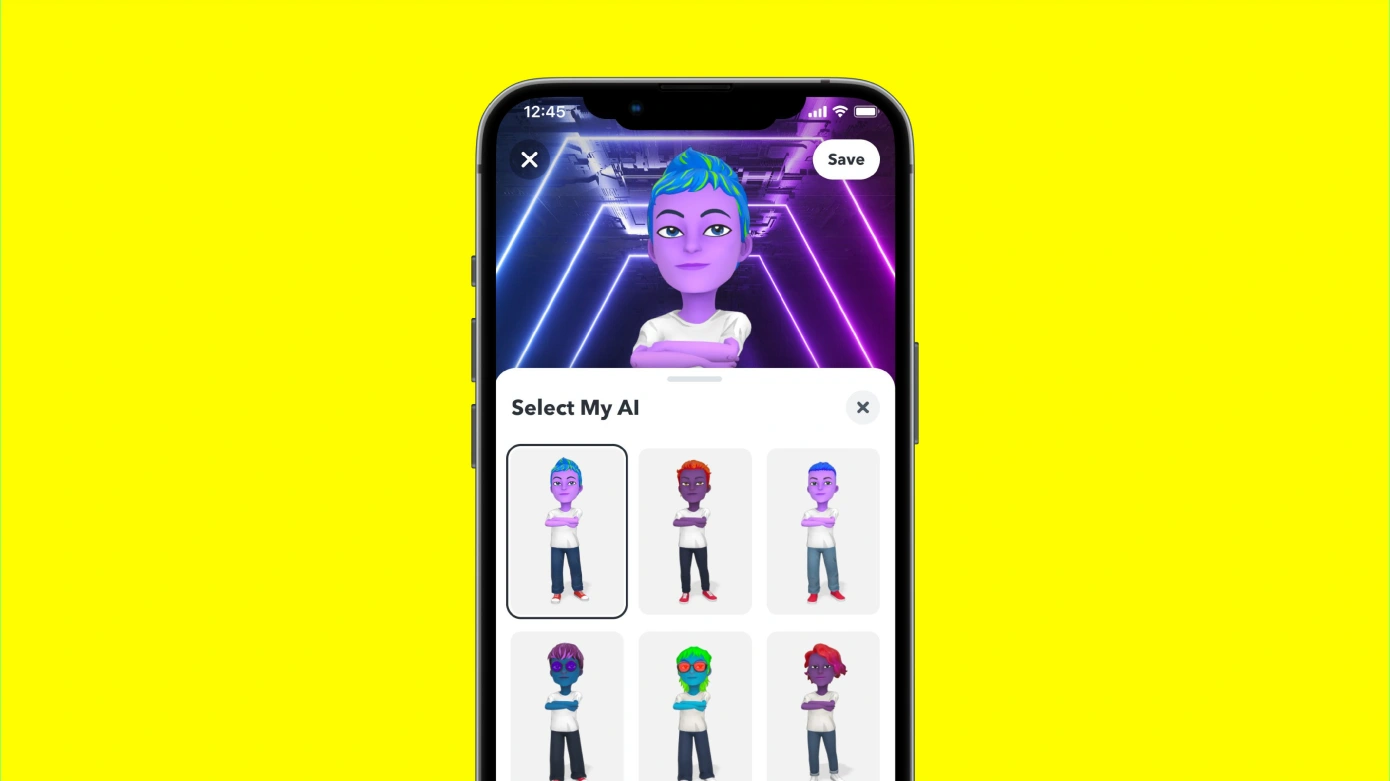With the introduction of Snapchat’s new AI-powered chatbot, social media is taking however one more leap into the more and more complicated planet of artificial intelligence.
Nevertheless, this ambitious innovation has raised issues amid mothers and fathers and teenagers about its implications for consumer privacy, psychological wellness, and the good quality of human connections in the digital age.
As a consequence, numerous are questioning regardless of whether we may well be pushing the boundaries of technological advancement as well far inside social media platforms.
Social media has come a extended way from its early days as an on-line venue for straightforward interactions and sharing updates with pals. Today’s platforms boast sophisticated algorithms for personalizing material feeds, superior focusing on abilities for advertisements, and an ever-developing array of attributes created to keep users engaged – such as AI-driven resources this kind of as chatbots.
Despite the fact that these innovations have undoubtedly contributed to richer consumer experiences total, they’ve also raised queries about their broader implications on society: Are we turning into as well reliant on machines? Is our information currently being exploited in approaches that compromise our privacy? And probably most regarding: How do developments like Snapchat’s extensively-employed AI chatbot have an effect on real human connections?
For some observers of technological innovation trends in places this kind of as Silicon Valley or Shenzhen’s tech bubble echo chambers look far eliminated from each day existence but latest controversies relevant to misinformation campaigns orchestrated by means of Facebook throughout key political occasions serve as stark reminders that what takes place on-line does matter offline as well – specifically when it impacts core democratic processes or contributes to enhanced polarization among citizens all around contentious concerns affecting their communities at massive scale degree (e.g., immigration policy debates).
In response to developing issues more than AI integration in social media platforms like Snapchat—particularly with regard to youthful users—policymakers and business leaders alike have to grapple with challenging queries surrounding ethics codes essential for guiding accountable tech innovation.
Snapchat’s New AI Chatbot
Snapchat’s AI chatbot, dubbed “My AI,” is an experimental, interactive attribute that aims to increase consumer knowledge by offering support in numerous duties this kind of as answering queries, providing guidance, or even preparing journeys. Powered by OpenAI’s GPT technology—which is also currently being integrated into Microsoft’s Bing search engine—My AI is created to supply customized and engaging conversations with end users by means of its all-natural language processing abilities.


Given that its launch, My AI has rapidly acquired reputation amid Snapchat end users throughout the world. Previously obtainable only to subscribers of the paid services Snapchat+, the attribute was later on rolled out to all 750 million end users globally due to rising demand.
In accordance to Snap representatives, early adopters have been enjoying interacting with the chatbot, with hundreds of thousands of messages sent every day.
Regardless of its widespread adoption and good evaluations from numerous end users who get pleasure from the ease it gives or uncover it entertaining, My AI has sparked issues amid numerous groups such as teenagers, mothers and fathers, educators, business authorities panelists at privacy conventions alike.
Some typical worries consist of how this new device could influence consumer privacy—which led Snap to release a blog post clarifying their stance on place information usage—and likely concerns relevant psychological wellness linked getting artificial companions simulating human interactions altering expectations all around interpersonal communication capabilities advancement throughout formative many years specifically adolescents whose brains are nonetheless building.
For illustration, Lyndsi Lee, a operating mom from Missouri, expressed apprehension about making it possible for her 13-12 months-outdated daughter entry to My AI right up until more details about the app turns into obtainable.
She believes it is critical to set healthful boundaries and tips for monitoring its use in buy to make certain that young children truly feel comfy navigating potential technologies.
Lee emphasized the require for youthful end users to find out how to differentiate among laptop-produced responses and real conversations with pals, peers, and family members members.
In today’s planet, it is important to cultivate empathy and integrity in our each day interactions past the digital universe of social media.
Platforms like Facebook, Instagram, YouTube, and TikTok have a enormous influence on shaping the perspectives and core beliefs of youthful folks. These apps perform a part in molding their identities, values, and friendships that final a lifetime.
The Position of AI in Social Media
From material personalization and enhanced ad focusing on to superior analytics and audience insights, the incorporation of AI technologies has transformed how end users interact with a single one more on these platforms.
The use of AI-driven resources this kind of as chatbots, recommendation algorithms, automated moderation methods, and much more is turning into more and more typical across all key social media networks.
This trend displays an ongoing push in the direction of providing much more customized and engaging consumer experiences by leveraging the electrical power of intelligent methods (like ChatGPT) that can adapt to every individual’s distinctive preferences and behaviors.
Disadvantages of AI consist of some key privacy issues, specifically amid youthful grownups. The immense quantity of information necessary for personalization can be a double-edged sword.
Positive, we get these incredible tailored experiences, but at the exact same time, we may well be placing our delicate details at chance.
Other ethical concerns like psychological wellness impacts are also a pressing issue—particularly amid younger audiences—as extreme use could contribute to emotions of isolation or exacerbate current situations like nervousness or depression due to comparison with others’ seemingly image-best lives on-line.
As chatbots like Snapchat’s My AI turn out to be much more superior in replicating human-like conversation patterns, it is turning into tougher to inform that they are not in fact human.
Usually, these chatbots never reveal their correct nature throughout back-and-forth messaging, leaving participants unaware of who they are truly speaking to. This raises issues about manipulation, misinformation, and the likely substitute of real human connections.
These concerns could undermine believe in and authenticity in our conversations, not just on-line but also in our day-to-day interactions with folks in numerous social settings, each public and personal.
Balancing Personalization and Privacy
As AI chatbots like Snapchat’s My AI strive to supply customized experiences for end users, the assortment and use of even much more consumer information has turn out to be a essential element of their performance. Nevertheless, this approach raises queries about keeping privacy whilst concurrently providing tailored interactions.
For AI-driven resources to supply customized companies, they have to gather and analyze huge quantities of consumer data—including behavioral patterns, preferences, messages, and posts.
Whilst information assortment has been element of social media platforms for many years, it is in no way been personified very like this before—making its extent and utilization uncomfortably obvious for some end users.
This details enables the chatbot to “comprehend” person end users far better and customize its responses accordingly. Nonetheless, with substantial information assortment comes likely hazards relevant to how this details is stored, accessed, or even abused.
Whilst platforms do their very best to employ safeguards that safeguard consumer information from nosy men and women searching to steal delicate details, breaches can nonetheless occur.
Snapchat’s dealing with of consumer place information specifically raised eyebrows when folks shared screenshots depicting personalized restaurant recommendations based mostly on their location—all provided by My AI conversations. This revelation sparked heated debates about privacy violations and regardless of whether this kind of companies constituted an invasion into personalized details with out consent.
In addition to privacy issues, there have been reviews final month relating to inappropriate responses offered by My AI following interacting with youthful teenagers—an alarming predicament that prompted quick interest from developers.
Snapchat vowed in a statement to increase the chatbot’s responses, creating it mindful of users’ ages and implementing substantial alterations to make certain much more accountable interactions.
It truly is clear that much more dialogue is required to tackle essential issues all around ethical and accountable use of this kind of technologies just before they are extensively accepted by social media end users throughout the world.
We ought to also be mindful of sneaky monitoring practices employed by third-events that are hidden inside seemingly harmless scripts operating in the background.
As end users navigate a web site or app, they may well unknowingly give away details about their pay a visit to, searching background, or place. There is a require for stricter laws to promise accountability and transparency when it comes to dealing with personalized identifiable details in the digital ecosystem.
The net spans numerous geographic areas and jurisdictions, typically top to inconsistent legal frameworks and safety specifications.
Obtaining the best stability among delivering engaging customized experiences and keeping consumer privacy is very the challenge. This entails a delicate determination-creating approach for executives, designers, engineers, and coders operating on the advancement of these intricate technologies that influence hundreds of thousands of lives globally each and every day.
Some likely answers consist of implementing much more robust safety measures, crafting transparent policies, and providing end users manage more than their shared information.
Supplying end users with the choice to opt-out of specific attributes if they are unpleasant sharing particular details is one more way to respect privacy whilst nonetheless enjoying the ease and enjoyment presented by well-liked on-line apps and internet sites.
So What is Following?
There is been a whole lot of debate about Snapchat’s AI chatbot and what it may well indicate for folks making use of social media, specifically the younger crowd. It truly is essential that we pay out interest to the ethics of the predicament and make confident we’re guarding people’s privacy as tech keeps shifting.
We require to understand that AI is going to be a large element of our lives, in every little thing from our personalized products to sectors like healthcare and training.
And as we uncover our way by means of this quickly shifting tech planet, it is critical that everyone—like the folks creating the tech, these creating the principles, and us as a society—work with each other to develop tips that target on currently being clear and open, retaining information protected, and creating confident we can inform the variation among true human interaction and the variety designed by AI.
Mothers and fathers staying up to date with these developments and getting critical conversations about them can assist develop a safer on-line room for their little ones. Only time will inform what is going to occur up coming.




